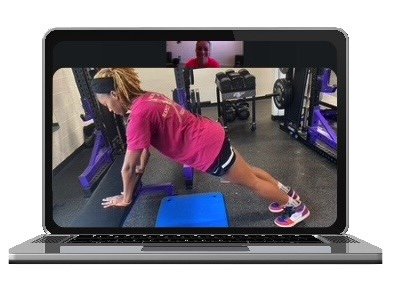What Is It Like to Run a Marathon While Pregnant?

Last month, we put out a survey to women who had completed a marathon while pregnant. Detailed below are the survey results, as well as tips for marathon training while pregnant- all from the experiences of those who have actually done it!
For reference, 24 women in total completed this survey. 12 responders ran a marathon in their 1st trimester, 11 in their 2nd trimester, and 1 in her 3rd trimester.
Note: Running a marathon pregnant is not for every runner or every pregnancy. Completing one will not equate to an easier or healthier pregnancy or labor. There are also several health concerns and risks to be aware of, for a full blog post on this topic, click here.
Training:
Many women completed the same exact training as they would in a normal marathon training cycle. These women were typically early in their pregnancy or became pregnant while they were already training for their race. Other suggestions given were to make sure every workout has a purpose, and to run speed workouts off of effort rather than pace. Several respondents cut out speed work all together.
There was a bit of variability in training mileage completed by pregnant marathoners. 50% of respondents ran the same weekly mileage as a typical training cycle. Other women cut down mileage to as much as 50%, while others stayed closer to 70-85% of typical mileage. Our advice would be to adjust your training mileage week by week according to how you feel. Some weeks you may respond well to full mileage, whereas other weeks may require more rest.
One responder advised to keep long runs the same, and to then either substitute, cut out or shorten weekly runs. Weekly non-essential runs can be substituted with other forms of aerobic exercise (such as biking or elliptical) that condition the heart without high impact forces.
Fueling and Hydration:
Most women in our survey kept a similar fueling strategy to a typical marathon, though some mentioned taking in a higher amount of calories. Remember that you burn more calories while pregnant due to a higher caloric baseline and higher body weight. It would make sense to take in more calories than is typical.
Many people also mentioned that they changed the type of fuel they used during their marathon, choosing options that were lower in caffeine and that were more palatable. Pregnant women have a limit of 200 mg caffeine per day.
Nearly all pregnant marathoners mentioned an increase in hydration needs during their race. Remember that pregnant women have higher fluid needs than a typical person, and there are risks to both mother and baby associated with dehydration. For more information on electrolytes, dehydration and pregnancy, see article here.
Pacing/exertion level:
There was high variability in the paces run by the pregnant marathoners in our study. 29% of marathoners ran at the same pace or faster than a typical marathon, and 50% ran 1-2 min/mile slower. Keep in mind that 50% of these women were in their 1st trimester, 45% were in the 2nd trimester and we don’t know previous marathon times or how hard they ran.
50% of pregnant women surveyed did a combination of running and walking during their marathon.
Running pace while pregnant depends on many individualized factors (base fitness, pregnancy stage etc.), so instead we would suggest using heart rate to guide speed. As mentioned in the article by Zavorsky and Longo (2012), exercise is safe for pregnant women as long as they stay below 90% of their max heart rate. When running at a moderate intensity, pregnant marathoners will typically be below this level, though tracking heart rate (via watch or chest monitor) could allow peace of mind if you are concerned. One woman from our survey advised-
Be ok with going slower and not setting PRs. Understand you may need to take walking breaks.
Belly Support and Footwear:
Many women may need to change their running shoe choice while pregnant due to changes in foot size and gait. For more information on this, see the article here. It is important to experiment with shoe choice during your training. We all know that proper and comfortable shoes during a marathon are crucial.
Several women in our survey also mentioned using a maternity support band during their marathon. This depends on the size of your belly and how far along you are. None of our respondents in their 1st trimester wore belly support, but 50% of respondents in the 2nd-3rd trimester wore some type of support band. If you are looking for a maternity support band during pregnancy, the ReCORE FITsplint is a great option. One respondent also advised that KT tape is a comfortable alternative to a band or belt.
Recovery:
Most survey respondents experienced a similar recovery post race to a normal marathon, and most saw few if any serious post race complications.
Women who did experience complications after their marathon mentioned: increased soreness, body aches, hemorrhoids, round ligament pain, pubic symphysis dysfunction, and incontinence problems.
General Advice:
Below is a compilation of advice given from the women in our poll on how to successfully run a marathon while pregnant:
- - Strength training is essential! (This was the most common suggestion, and many suggested focusing on hips and pelvic floor)
- - Build mileage before pregnancy. If your body is used to it before pregnancy, body may handle it better while pregnant.
- - Make sure you are getting enough fuel to maintain weight gain during pregnancy.
- - Adjust expectations, be patient with self and don’t compare to others (pregnant or not).
- - Don’t be upset about a slower pace, and don’t be afraid to walk. This is not the best time to get a PR.
- - Use other methods of cardio to train.
- - You may get more aches and pains during long runs, so stretch!
- - “Be prepared to defend your choice to run, but remember you don’t owe anyone an explanation as long as you are listening to your body and your doctor”
And now, perhaps what we all are wondering- Based on their experience, would they run a marathon while pregnant again?
67% of responders said they would run another marathon while pregnant, depending on their situation and how far along they were. 25% of responders said “No”, mainly due to health complications and the time commitment. 8% had mixed feelings.
- “Yes, it made me more conscious of a runner. A lot of what I learned training pregnant will help me in non-pregnant races. And after any training run I always felt less sick/tired than when I started”
- “No, because marathon training is a full time job. So to train and also have a full time job and be pregnant was a lot. I was not able to train like expected.”
Running a marathon while pregnant is a fairly complicated topic. It certainly is not something that should be done by every pregnant runner, however it seems that experienced distance runners with a low risk pregnancy can run it safely with certain precautions. It certainly requires an intense understanding of your changing body’s limits and personal health. Many women who completed our survey mentioned that running a marathon while pregnant not only helped them to feel thankful for their body, but also to feel powerful and strong in what can be a difficult stage of life.
As a reminder from our previous post, here is a safety checklist to keep in mind if you are considering running a marathon while pregnant (see previous post here for more details):
- - Obtain doctor’s clearance.
- - Be accustomed to marathon training before pregnancy, or have run a marathon recently.
- - No high risk pregnancy.
- - Run marathon at an easy to moderate pace. Be sure to keep heart rate below 90% of max heart rate.
- - Stay properly fueled and hydrated with electrolytes (according to increased needs during pregnancy).
- - Consider wearing a belly support band for pelvic, bladder and back support.
- - Keep hips, glutes, core and pelvic floor strong.
- - Stop running if you experience pain or any contraindications to exercise (see list above).
Thanks so much to the women who completed the survey, their insight was vital to this article, and will help other women hoping to continue long distance running through pregnancy!
Notice: Please consult your physician before beginning any exercise program.
If you would like more information, below are links to articles detailing specific women’s experiences while running a marathon pregnant:
Marine Corps Marathon at 12 Weeks Pregnant
SF Marathon at 3 Months Pregnant
Boston Marathon at 7 Months Pregnant
Went into Labor After Running Chicago Marathon
Article Detailing the Experience of Several Women
Marathon While 7 Months Pregnant with 5th Child
Boston Marathon at 7.5 Months Pregnant
References:
Forczek, W., Ivanenko, Y. P., Bielatowicz, J., & Wacławik, K. (2018). Gait assessment of the expectant mothers – Systematic review. Gait & Posture, 62, 7–19. https://doi.org/10.1016/j.gaitpost.2018.02.024F
Høeg, T. B. (2017, December 29). Baby on board: Long-distance running during pregnancy. iRunFar. https://www.irunfar.com/baby-on-board-long-distance-running-during-pregnancy.
Kuhrt, K., Harmon, M., Hezelgrave, N. L., Seed, P. T., & Shennan, A. H. (2018). Is recreational running associated with earlier delivery and lower birth weight in women who continue to run during pregnancy? An international retrospective cohort study of running habits of 1293 female runners during pregnancy. BMJ Open Sport & Exercise Medicine, 4(1), e000296. https://doi.org/10.1136/bmjsem-2017-000296
Leitner, M., Moser, H., Eichelberger, P., Kuhn, A., & Radlinger, L. (2016). Evaluation of pelvic floor muscle activity during running in continent and incontinent women: An exploratory study. Neurourology and Urodynamics, 36(6), 1570–1576. https://doi.org/10.1002/nau.23151
Szumilewicz, A., Dornowski, M., Piernicka, M., Worska, A., Kuchta, A., Kortas, J., Błudnicka, M., Radzimiński, Ł., & Jastrzębski, Z. (2019). High-low impact exercise program including pelvic floor muscle exercises improves pelvic floor muscle function in healthy pregnant women – a randomized control trial. Frontiers in Physiology, 9. https://doi.org/10.3389/fphys.2018.01867
Zavorsky, G. S., & Longo, L. D. (2012). Viewpoint: Are there valid concerns for completing a marathon at 39 weeks of pregnancy? Journal of Applied Physiology, 113(7), 1162–1165. https://doi.org/10.1152/japplphysiol.01426.2011





















Aubree McLeod is an ACSM-EP exercise physiologist, researcher in running biomechanics. She has also completed the ICE Preg & PostPartum Course for athletes. She has an M.S. in Exercise Science and has worked in a variety of spaces within the exercise science field including physical therapy, education, research, and run coaching for... Read More